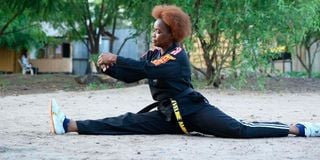'Men fear dating me': The Taekwondo star crushing gender myths

Carolyne Ambani, a Taekwondo coach doing some exercises at the Kakuma One Women Centre in Turkana County on October 24, 2024. She trains young girls at Kakuma Refugee Camp to help them in self-defence.
What you need to know:
- Carolyne Ambani defied gender stereotypes to become a taekwondo instructor at Kakuma Refugee Camp, where she now trains about 100 girls in self-defense.
- Through the UNFPA-supported Play to Protect initiative, her work has led to a 30 per cent decrease in gender-based violence among participants.
- Despite facing discrimination and being told she's "too dangerous to marry," she continues her mission of using martial arts to transform lives in one of Africa's largest refugee camps.
The rhythmic chants of "hea...hea...hea...Taekwondo!" pierce the afternoon air at Women Centre One in Kakuma Refugee Camp. Inside, young girls practice punching and kicking techniques with fierce determination, their movements precise and powerful under the watchful eye of their instructor, Carolyne Ambani. The scene is a testament to determination and changing times – a female taekwondo instructor training refugee girls in one of Africa's largest refugee camps.
When Carolyne first decided to enrol in taekwondo training, her decision was met with scepticism and surprise. Family and friends questioned why she would venture into what they considered a male domain. But Carolyne saw beyond these gender stereotypes, driven by a passion that had been kindling since her childhood.
"Compared to others, Taekwondo is a very special sport," Carolyne tells Nation.Africa, her eyes lighting up as she watches her students practice.
"I am a living testament that what a man can do, a woman can do better. I am happy that the number of girls in this sport is increasing by the day."
Her journey into martial arts began in primary school, where her love for physical education and gymnastics first bloomed. Through high school, she found herself drawn to Taekwondo matches on television and in stadiums, nurturing a passion that would later define her career path. When she came of age, she made the bold decision to pursue formal training, despite the raised eyebrows and whispered doubts.

Carolyne : The black belt breaking gender norms in Kakuma.
The road hasn't been easy. As a black belt holder and coach since 2019, Carolyne has faced discrimination from both men and women.
"Whenever I say I am a Taekwondo coach or enthusiast, many people and especially men, tend to fear me," she shares.
"I have heard men say that they cannot marry such a woman. What they do not know is that Taekwondo is just a calm sport. We do not fight, it's only for self-defence."
Today, Carolyne trains about 100 girls as part of the Play to Protect initiative, an innovative project by UNFPA implemented by FilmAid Kenya, Kenya Red Cross Society, and International Rescue Committee. The program aims to harness sport's power to strengthen protection and empowerment of young women and girls while addressing gender-based violence within the community.
The impact of her work resonates deeply within the refugee community.
For Grace Maombi, who fled from the Democratic Republic of Congo in 2013, these classes represent more than just sport.
"I now feel happy, more comfortable and self-confident," she says, her voice steady and assured. She is one of Carolyne’s trainees.
"This sport has taught us to be more disciplined and respectful. I am now able to protect myself and siblings from enemies and perpetrators."
Another student, Rashel Mapendo, also from DRC Congo, credits the sport with transforming her self-esteem.
"I now have high self-esteem and self-confidence courtesy of this sport," she beams. "Going forward, I will be able to deal with strangers who normally come to steal food at home without fear."
The significance of this initiative cannot be overstated in a setting like Kakuma, where women and girls face numerous challenges. They are particularly vulnerable at unmanned water points and during firewood collection, making self-defence skills crucial for their safety.
According to Magdaline Mwithali, a Project Officer at FilmAid Kenya, the program has already trained 110 Taekwondo members, including adolescent girls, young women, and boys. The initiative goes beyond physical training, incorporating education on gender equality, leadership, and challenging harmful gender norms.
The results are encouraging. "As result of the Play to Protect initiative now in its third year, there has been a reported 30 per cent decrease in experiences of gender-based violence among the participating young people," Magdaline tells Nation.Africa.
"The program's focus on leadership and self-confidence has also fostered greater psychosocial well-being and social inclusion."
UNFPA Country Representative Anders Thomsen emphasises the program's importance, noting that about 70 per cent of Kakuma refugee camp residents are women and girls.
"Some of them have been affected by rampant gender-based violence that have been rampant," he explains. "That is why the Play to Protect initiative is paramount as it will help them to stay safe."
Before she was a coach, Carolyne taught physical fitness, but her transition to Taekwondo instruction in 2019 marked the beginning of a larger mission. She saw an opportunity not just to teach a sport, but to empower women and girls with confidence and practical self-defence skills.
"Taekwondo is very important for women," she explains with conviction. "It gives them self-confidence, helps them to have physical fitness and gives them indomitable spirit. I am happy to note that some of the girls have been able to defend themselves with the skills that they have learnt."
Breaking barriers
As the sun sets on another training session, Carolyne's message to women and girls remains unwavering: "It is a very safe sport and I ask women not to shy away from it. Martial arts is good for fitness and enhances mental wellness. Taekwondo will help you sweat out the stress."
In the heart of Kakuma, through the power of martial arts, these girls are not just learning self-defence – they're building confidence, community, and a future where they can stand tall and unafraid. The chants of "hea...hea...hea" continue to echo, a testament to the transformative power of breaking barriers and defying expectations.




